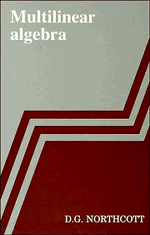Summary
General remarks
From a graded coalgebra it is possible, by considering linear forms on the submodules which make up the grading, to derive a graded algebra. In fact, this is the conclusion of Theorem 8 of Chapter 7. An attempt to perform a similar construction starting instead with a general graded algebra soon runs into difficulties; but when the algebra is suitably restricted the process can be carried through successfully to produce a graded coalgebra as the end-product.
In the present chapter these ideas are developed in detail and it is shown that, for non-negatively graded algebras and coalgebras whose grading modules are free modules of finite rank, one has a full duality theory. This not only interchanges algebras and coalgebras, but also preserves ordinary and modified Hopf algebras.
The first two sections of the chapter are used to establish the results on modules that provide the basis of this theory. As always, R denotes a commutative ring with an identity element, and the symbol ⊗, when used without a subscript, indicates a tensor product formed over R.
Modules of linear forms
It was remarked in the introduction to this chapter that the duality we shall be discussing arises from the study of linear forms on free modules with finite bases. However, before we restrict our attention to such modules it is convenient to make some observations concerning linear forms on arbitrary modules.
Information
- Type
- Chapter
- Information
- Multilinear Algebra , pp. 175 - 196Publisher: Cambridge University PressPrint publication year: 1984
